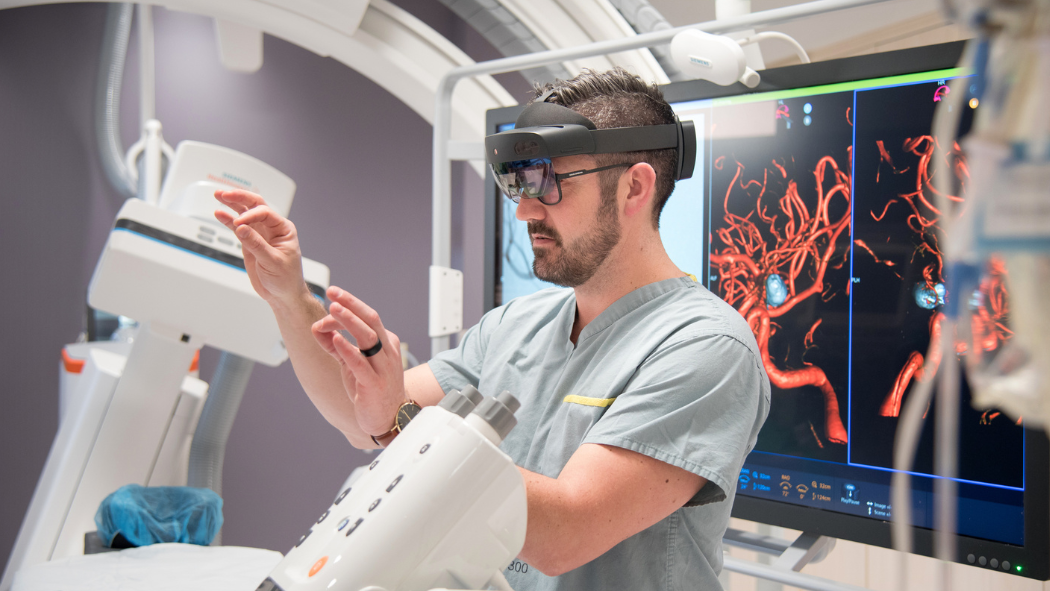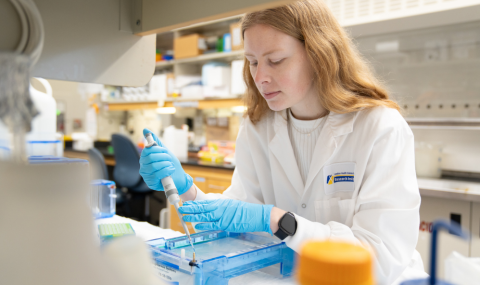
March 7, 2024
(LONDON, ON) - Mixed reality is being introduced to patient care at London Health Sciences Centre (LHSC) through an innovative research project. Supported through LHSC's Academic Realignment Initiative Awards, the technology is currently being tested to improve patient outcomes in interventional radiology procedures.
First introduced in 2022, LHSC recently announced 15 additional research and quality improvement projects that will be supported through the Academic Realignment Initiative Awards with more than $1 million in funding from London Health Sciences Foundation and Children’s Health Foundation.
“These Awards reflect LHSC’s commitment to embedding research and learning throughout our operations,” says Cheryl Litchfield, Senior Director of Research Operations, LHSC. “These new projects will help strengthen patient outcomes by enhancing surgical procedures, optimizing imaging technologies, and elevating treatments for a wide range of conditions. We are seeing incredible results from our first round of awards, including the testing of mixed reality in interventional radiology.”
Jonathan Collier, an interventional radiology technologist at LHSC, was among the first group of recipients and saw an opportunity to optimize the use of innovative imaging technology through a growing partnership with Siemens Healthineers. One focus of his research is the use of mixed reality technology in angiography suites, which are used to provide minimally invasive surgeries. Interventional radiologists diagnose and treat many conditions using minimally invasive procedures, including placing stents to open blocked blood vessels. These procedures typically require a stationary 60–inch monitor, which can be restrictive to the care team.
Collier collaborated with Dr. David Hocking, Diagnostic and Interventional Radiologist at LHSC, to pioneer the use of the Microsoft HoloLens in interventional radiology. The HoloLens is a mixed reality headset with see-through holographic lenses that allows users to consult crucial imaging through holograms while remaining aware of their physical surroundings and maintaining closer contact with patients.
“As advancements in angiography introduce more images and data for physicians to make informed decisions, large display monitors occupy a considerable amount of tableside space, which puts a wall between the health care workers and the patients,” explained Collier. “Mixed reality technology enables health care teams to continue to focus on the patient while maintaining access to the most advanced images.”
The team hopes the technology – which is being paired with software developed by a team led by Collier and Dr. Hocking – will allow patients to feel more connected to their health care providers while improving patient safety. Studies have shown that physicians needing to turn away from the patient to view a monitor can reduce accuracy. The HoloLens allows the physician to keep the imaging data and patient in the same field of view with the goal of improving patient outcomes.
“This technology has the potential to change the future of interventional radiology," says Collier. “Through support of LHSC’s Academic Realignment Initiative Awards, we are testing leading-edge innovation that can improve the delivery of care for our community and is already attracting interest from other healthcare organizations.”
Media contact:
Celine Zadorsky
Senior Media Relations Consultant
London Health Sciences Centre
226-927-2309
media@lhsc.on.ca


